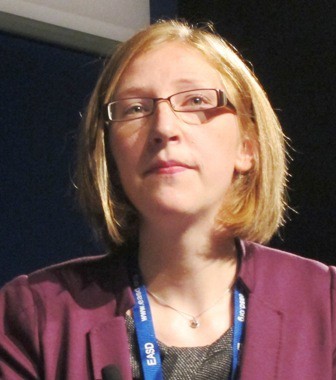User login
Weight Loss After Roux-en-Y Tied to Type 2 Diabetes Reversal
BERLIN – Roux-en-Y gastric bypass surgery can reverse type 2 diabetes in up to 73% of patients – even in those with long-standing disease.
Disease remission even occurred in 38% of those who had diabetes for longer than 8 years, with all who were taking insulin able to discontinue the medication, Dr. Sarah Steven said at the annual meeting of the European Associations for the Study of Diabetes.
Dr. Steven, of Newcastle (England) University, presented a retrospective study of 73 patients with type 2 diabetes who underwent gastric bypass surgery with the Roux-en-Y technique. Most (46) were women; the group’s median age was 49 years. Their median disease duration was 5 years, although the range was wide, from 1 month to 19 years. She did not give a median follow-up time, but did say that it was a minimum of 3 months.
Overall, they were obese, with a median body mass index of 50 kg/m2. Their median preoperative hemoglobin A1c was 7.1%. Criteria for reversal was a postoperative HbA1c of 6%.
At baseline, all of the patients were taking metformin and 12 were also on insulin. Other medications included sulphonylurea, thiazolidinedione, glucagon-like peptide-1 agonist, and dipeptidyl peptidase-4 inhibitor.
Diabetes reversal occurred in 79% of those with short-duration disease (up to 4 years); 73% of the patients were able to discontinue all diabetes medications. *Diabetes reversed in 38% of those who had the disease longer than 8 years; 21% of that group no longer needed any antidiabetic medication.
The amount of weight lost was significantly associated with disease reversal. Reversal occurred in 50% of the group that lost fewer than 10 kg/m2; in 73% of those that lost 10-15 kg/m2; and in 76% of those who lost more than 15 kg/m2.
In the group with long disease duration, the mean weight loss in those whose diabetes reversed was 34 kg/m2, compared with 21 kg/m2 in those whose diabetes did not.
Weight loss also significantly influenced the individual ability to successfully withdraw from diabetes medications. About a quarter (27%) of those who lost fewer than 10 kg no longer needed the drugs. However, 67% of those who lost 10-15 kg/m2 and 50% of those who lost more than 15 kg/m2 no longer needed any of the medications.
"The reversal of type 2 diabetes seems to depend on the degree of weight loss," Dr. Steven said. "Individuals with long-term diabetes are likely to have gained more weight than those with short-term – this is in part due to the natural history of the disease and is compounded by the use of medications and insulin therapy. It’s hypothesized that these individuals may need to lose more weight to reach the target weight that will normalize their glucose levels."
The benefit of weight loss is most likely tied to improved beta cell functioning, Dr. Steven suggested. "There is good in vitro evidence that saturated fatty acids are particularly detrimental to beta cells, inhibiting acute insulin secretion and inducing apoptosis. Autopsy studies have shown that beta cells continue replication and neogenesis [in type 2 diabetes], so it’s at least theoretically possible that beta cell function could be regained at any stage of the disease upon removal of the toxic environment."
Dr. Steven did not disclose any financial relationships.
*CORRECTION 10/26/12: This article misstated the percentage of long-term diabetes patients (having the disease more than 8 years) who experienced disease reversal. Diabetes reversed in 38% of this population.
Disease remission, Dr. Sarah Steven, European Associations for the Study of Diabetes, sulphonylurea, thiazolidinedione
BERLIN – Roux-en-Y gastric bypass surgery can reverse type 2 diabetes in up to 73% of patients – even in those with long-standing disease.
Disease remission even occurred in 38% of those who had diabetes for longer than 8 years, with all who were taking insulin able to discontinue the medication, Dr. Sarah Steven said at the annual meeting of the European Associations for the Study of Diabetes.
Dr. Steven, of Newcastle (England) University, presented a retrospective study of 73 patients with type 2 diabetes who underwent gastric bypass surgery with the Roux-en-Y technique. Most (46) were women; the group’s median age was 49 years. Their median disease duration was 5 years, although the range was wide, from 1 month to 19 years. She did not give a median follow-up time, but did say that it was a minimum of 3 months.
Overall, they were obese, with a median body mass index of 50 kg/m2. Their median preoperative hemoglobin A1c was 7.1%. Criteria for reversal was a postoperative HbA1c of 6%.
At baseline, all of the patients were taking metformin and 12 were also on insulin. Other medications included sulphonylurea, thiazolidinedione, glucagon-like peptide-1 agonist, and dipeptidyl peptidase-4 inhibitor.
Diabetes reversal occurred in 79% of those with short-duration disease (up to 4 years); 73% of the patients were able to discontinue all diabetes medications. *Diabetes reversed in 38% of those who had the disease longer than 8 years; 21% of that group no longer needed any antidiabetic medication.
The amount of weight lost was significantly associated with disease reversal. Reversal occurred in 50% of the group that lost fewer than 10 kg/m2; in 73% of those that lost 10-15 kg/m2; and in 76% of those who lost more than 15 kg/m2.
In the group with long disease duration, the mean weight loss in those whose diabetes reversed was 34 kg/m2, compared with 21 kg/m2 in those whose diabetes did not.
Weight loss also significantly influenced the individual ability to successfully withdraw from diabetes medications. About a quarter (27%) of those who lost fewer than 10 kg no longer needed the drugs. However, 67% of those who lost 10-15 kg/m2 and 50% of those who lost more than 15 kg/m2 no longer needed any of the medications.
"The reversal of type 2 diabetes seems to depend on the degree of weight loss," Dr. Steven said. "Individuals with long-term diabetes are likely to have gained more weight than those with short-term – this is in part due to the natural history of the disease and is compounded by the use of medications and insulin therapy. It’s hypothesized that these individuals may need to lose more weight to reach the target weight that will normalize their glucose levels."
The benefit of weight loss is most likely tied to improved beta cell functioning, Dr. Steven suggested. "There is good in vitro evidence that saturated fatty acids are particularly detrimental to beta cells, inhibiting acute insulin secretion and inducing apoptosis. Autopsy studies have shown that beta cells continue replication and neogenesis [in type 2 diabetes], so it’s at least theoretically possible that beta cell function could be regained at any stage of the disease upon removal of the toxic environment."
Dr. Steven did not disclose any financial relationships.
*CORRECTION 10/26/12: This article misstated the percentage of long-term diabetes patients (having the disease more than 8 years) who experienced disease reversal. Diabetes reversed in 38% of this population.
BERLIN – Roux-en-Y gastric bypass surgery can reverse type 2 diabetes in up to 73% of patients – even in those with long-standing disease.
Disease remission even occurred in 38% of those who had diabetes for longer than 8 years, with all who were taking insulin able to discontinue the medication, Dr. Sarah Steven said at the annual meeting of the European Associations for the Study of Diabetes.
Dr. Steven, of Newcastle (England) University, presented a retrospective study of 73 patients with type 2 diabetes who underwent gastric bypass surgery with the Roux-en-Y technique. Most (46) were women; the group’s median age was 49 years. Their median disease duration was 5 years, although the range was wide, from 1 month to 19 years. She did not give a median follow-up time, but did say that it was a minimum of 3 months.
Overall, they were obese, with a median body mass index of 50 kg/m2. Their median preoperative hemoglobin A1c was 7.1%. Criteria for reversal was a postoperative HbA1c of 6%.
At baseline, all of the patients were taking metformin and 12 were also on insulin. Other medications included sulphonylurea, thiazolidinedione, glucagon-like peptide-1 agonist, and dipeptidyl peptidase-4 inhibitor.
Diabetes reversal occurred in 79% of those with short-duration disease (up to 4 years); 73% of the patients were able to discontinue all diabetes medications. *Diabetes reversed in 38% of those who had the disease longer than 8 years; 21% of that group no longer needed any antidiabetic medication.
The amount of weight lost was significantly associated with disease reversal. Reversal occurred in 50% of the group that lost fewer than 10 kg/m2; in 73% of those that lost 10-15 kg/m2; and in 76% of those who lost more than 15 kg/m2.
In the group with long disease duration, the mean weight loss in those whose diabetes reversed was 34 kg/m2, compared with 21 kg/m2 in those whose diabetes did not.
Weight loss also significantly influenced the individual ability to successfully withdraw from diabetes medications. About a quarter (27%) of those who lost fewer than 10 kg no longer needed the drugs. However, 67% of those who lost 10-15 kg/m2 and 50% of those who lost more than 15 kg/m2 no longer needed any of the medications.
"The reversal of type 2 diabetes seems to depend on the degree of weight loss," Dr. Steven said. "Individuals with long-term diabetes are likely to have gained more weight than those with short-term – this is in part due to the natural history of the disease and is compounded by the use of medications and insulin therapy. It’s hypothesized that these individuals may need to lose more weight to reach the target weight that will normalize their glucose levels."
The benefit of weight loss is most likely tied to improved beta cell functioning, Dr. Steven suggested. "There is good in vitro evidence that saturated fatty acids are particularly detrimental to beta cells, inhibiting acute insulin secretion and inducing apoptosis. Autopsy studies have shown that beta cells continue replication and neogenesis [in type 2 diabetes], so it’s at least theoretically possible that beta cell function could be regained at any stage of the disease upon removal of the toxic environment."
Dr. Steven did not disclose any financial relationships.
*CORRECTION 10/26/12: This article misstated the percentage of long-term diabetes patients (having the disease more than 8 years) who experienced disease reversal. Diabetes reversed in 38% of this population.
Disease remission, Dr. Sarah Steven, European Associations for the Study of Diabetes, sulphonylurea, thiazolidinedione
Disease remission, Dr. Sarah Steven, European Associations for the Study of Diabetes, sulphonylurea, thiazolidinedione
AT THE ANNUAL MEETING OF THE EUROPEAN ASSOCIATION FOR THE STUDY OF DIABETES
Major Finding: Up to 73% of obese patients with type 2 diabetes had normalized blood glucose after Roux-en-Y gastric bypass surgery.
Data Source: The retrospective study included 73 patients who had type 2 diabetes for 1 month to 19 years.
Disclosures: Dr. Sarah Steven did not note any financial disclosures.

